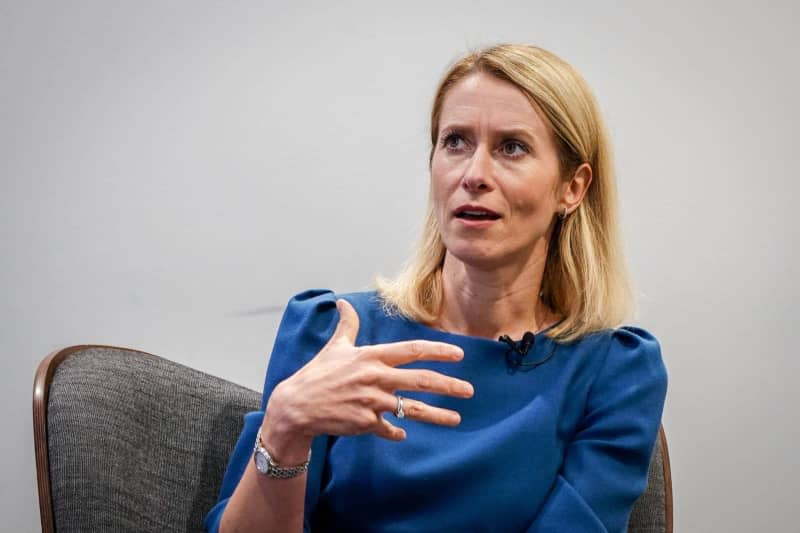Estonian secret service says Russia is preparing for confrontation

- Oops!Something went wrong.Please try again later.
Russia is preparing itself militarily for a confrontation with the West, the Estonian secret service said in a report released on Tuesday evening.
The preparations are indicated by Russian military reform, according to the annual report of the foreign intelligence service of the Baltic EU and NATO country presented in the Estonian capital Tallinn.
The reform reflects the Russian leadership's ideas regarding the resources required for the war in Ukraine and a confrontation with the West, it said.
"We can assume that within the next decade, NATO will be confronted with a mass army of the Soviet type, which is technologically inferior to the allies, but poses a significant threat due to its size, firepower and reserves," intelligence chief Kaupo Rosin wrote in the report.
In order to defend themselves against a possible conventional attack by such an army, the armies and defence industries of the NATO allies would have to be significantly better prepared and equipped than is currently the case, Rosin wrote.
For Estonia the military reform will mean a significant increase in the Russian armed forces near the Baltic state's border in the coming years, the report said.
Russia is also planning to station more troops on the border with the other Baltic states and Finland. Russia's aim is to achieve military dominance in the Baltic Sea region, according to the report. However, according to Rosin, the likelihood of a direct attack on Estonia this year is low.
Russia's Defence Minister Sergei Shoigu announced a reorganization of the Russian army at the end of 2022 in order to implement the increase in troop strength demanded by the Kremlin.
The combat power of the navy, the air force and the missile forces were also to be strengthened. The renewal of the structures should be completed between 2023 and 2026.
Earlier Tuesday, Estonian Prime Minister Kaja Kallas said there was "nothing suprising" about Moscow placing her, and other high-ranking Baltic politicians, on a list of "wanted" persons.
"Russia's move is nothing surprising," Kallas wrote on X, formerly Twitter. "This is yet more proof that I am doing the right thing – the EU's strong support to Ukraine is a success and it hurts Russia."
In addition to Kallas, Estonian Secretary of State Taimar Peterkop and Lithuanian Culture Minister Simonas Kairys are also on the Russian Interior Ministry's list.
The declaration is seen as symbolic since none of the politicians is expected to travel to Russia any time soon.
The Russian authorities blame the Baltic officials for the demolition of memorials to Soviet soldiers.
"These people are responsible for decisions that are actually tantamount to desecration of historical memory," Kremlin spokesman Dmitry Peskov said, according to the TASS news agency.
But affected officials sloughed it off, suggesting they considered the designation a badge of honour.
"I am glad that my work to remove the ruins of Sovietization has not gone unnoticed," Kairys commented on his inclusion on the list.
Lithuanian Foreign Minister Gabrielius Landsbergis, speaking to the BNS news agency in Vilnius on Tuesday about Kallas' designation, described Russia's "political assessment" as a "kind of honour for people who support Ukraine and support the fight of good against evil."
In her post on X, Kallas said: "The Kremlin now hopes this move will help to silence me and others – but it won't. The opposite. I will continue my strong support to Ukraine. I will continue to stand for increasing Europe's defence."
Latvia summoned the chargé d'affaires of the Russian embassy in Riga to explain "a publicly accessible list of former and current public officials of Latvia against whom politically motivated charges had been brought by Russia," the Foreign Ministry said in a statement on Tuesday evening.
Russia said it is serious about the "crimes" these leaders are alleged to have committed.
"You have to answer for crimes against the memory of those who liberated the world from Nazism and fascism. And this is just the beginning," Foreign Ministry spokeswoman Maria Zakharova wrote on Telegram, explicitly referring to Kallas and Peterkop.
In the summer of 2022, a few months after the start of the all-out Russian invasion of Ukraine, Estonia demolished a Soviet war memorial - a replica of a T-34 tank with a red Soviet star - in the town of Narva on the border with Russia.
In 2007, the relocation of a bronze statue, another Soviet war memorial, from a park in Tallinn to the outskirts of the city sparked days of protests. One person was killed in the riots and more than 1,000 people were detained. Angry Russian-speaking Estonians said that the removal of the monument erased their history.
A number of monuments from the Soviet era were also dismantled in Lithuania and Latvia following the Russian invasion of Ukraine.

